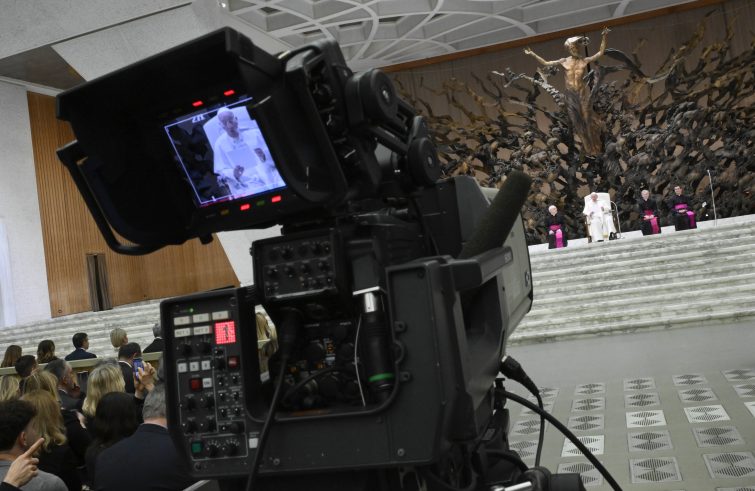
The Holy Father’s catechesis at the Wednesday General audience, which focused on the virtue of patience, was concluded with the testimony of two fathers, Rami Elhanan and Bassam Aramin, seated next to each other in the front row of Paul VI Hall. Their story is narrated in the book “Apeirogon” (Feltrinelli), authored by Irish writer Colum McCann. “Patience is the capacity to endure evils,” Francis said off-text: “And here today, in this audience, there are two people, two fathers: an Israeli and an Arab. Both have lost their daughters in this war, and both are friends; they do not look at the wickedness of the war, but at the friendship of two men who care about each other and who have experienced the same crucifixion.” “Let us think of the beautiful witness of these two people who have suffered the war in the Holy Land in the loss of their daughters.” “Dear brothers, thank you for your witness,” Francis said to the faithful present. Finally, the Holy Father renewed his plea for peace, which he expressed in his own words in his address to the Italian-speaking faithful: “May the Lord grant us peace! In the martyred Ukraine, which is suffering terribly under bombardment. In Israel and Palestine: may there be peace in the Holy Land. May the Lord bestow peace on us all, as a gift for his Easter”.
“Today the audience was supposed to take place in the Square, but because of the rain, it has been moved inside here. It is true that you will be rather crowded, but at least we will not get wet. Thank you for your patience!”
The Pope said as he explained to the faithful why the audience had been moved from St Peter’s Square to the Paul VI Hall because of the rainy weather in Rome. “Jesus’ patience does not consist in a stoical resistance to suffering, but is the fruit of a greater love”, Francis pointed out referring to the “meek strength” of patience. “At the root of patience is love,” he remarked, quoting St Augustine: “Each one of the just is in that measure for endurance of any ills more brave, in what measure in him the love of God is mightier” For the Pope, “there is no better witness to the love of Jesus than encountering a patient Christian. But think of how many mothers and fathers, workers, doctors and nurses, the sick, who every day, in obscurity, grace the world with saintly patience! As the Scripture affirms, ‘He who is slow to anger is better than the mighty.”
“We often lack patience”,
Francis said.
“In everyday life we are impatient, all of us”, he continued off text, adding that “we need” patience “as an ‘essential vitamin’ in order to get by, but it comes to us instinctively to respond to evil with evil; it is difficult to stay calm, to control our instincts, to refrain from bad responses, to defuse quarrels and conflicts in the family, at work, or in the Christian community. The response comes immediately; we are not capable of remaining patient.” But “let us remember that patience is not only a need, it is a calling – Francis remarked – if Christ is patient, the Christian is called to be patient.” For the Pope this demands
“that we go against the tide with respect to today’s widespread mentality, dominated by haste and wish for ‘everything straight away’;
in which, instead of waiting for situations to mature, people are pressed, in the expectation that they will change immediately.” “Let us not forget that haste and impatience are the enemies of spiritual life”, his counsel: “God is love, and those who love do not tire, they are not irascible; they do not give ultimatums; God is patient, God knows how to wait.” “Think of the account of the merciful Father, who awaits his son who has left home”, the example chosen by Francis: “he suffers patiently, impatient only to embrace him as soon as he sees him return; or think of the parable of the wheat and the weeds, with the Lord who is not in a hurry to uproot evil before its time, so that nothing is lost.” “Patience saves us everything!”, he exclaimed in unscripted remarks, noting that patience, as a “meek strength”, reminds us that “Christian virtue is not only a matter of doing good, but of tolerating evil as well.” “Another good exercise is to take to Him the most bothersome people, asking for the grace to put into practice towards them that work of mercy so well known, yet so disregarded:
patiently enduring troublesome people”,
is the proposal for this Easter season: “And it is not easy.”
“We have the habit of cataloguing people according to the mistakes they make. No, this is not good”,
Francis remarked. “Let us seek people by their faces, their heart, and by for their mistakes”, he added in unscripted remarks, with an invitation to “broaden one’s outlook. by not restricting the field of the world to our own troubles”, as the Imitation of Christ invites us to do: “’Well may you remember the very painful woes of others, that you may bear your own little ones the more easily’, recalling that ‘for with God nothing that is suffered for His sake, no matter how small, can pass without reward’.” “When we feel we are in the grip of adversity, as Job teaches us, it is good to open ourselves with hope to the newness of God, in the unwavering confidence that He does not let our expectations be disappointed”, Francis concluded.










